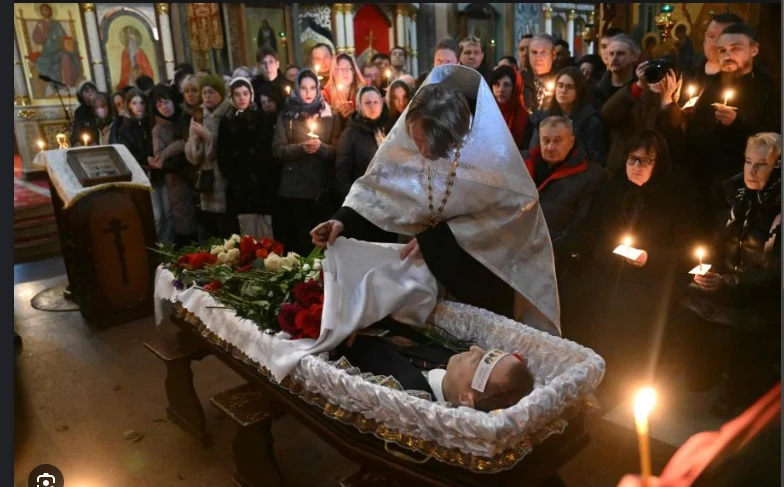Navalny buried in Moscow amid thousands of defiant mourners

Stay tuned with 24 News HD Android App

Russian opposition leader Alexei Navalny was laid to rest in Moscow on Friday, surrounded by crowds of mourners who chanted his name and blamed authorities for his death in prison.
Outside the cemetery where he was buried, some supporters shouted in grief while others yelled out slogans against the Kremlin and its offensive in Ukraine.
Despite a heavy police presence and official warnings, thousands of mourners paid their respects to the 47-year-old anti-corruption campaigner whose death in an Arctic prison was announced on February 16.
Navalny's death has been widely condemned by Western leaders and his allies have accused President Vladimir Putin of responsibility and of trying to prevent a dignified public burial.
The Kremlin, which has dismissed the accusations as "hysterical", warned against "unauthorised" protests around the funeral.
Navalny's body first lay in an open casket in a packed church in Maryino, southern Moscow, for a ceremony attended by his parents.
The coffin was closed immediately after the service, meaning many mourners who had wanted to file past were not able to pay their last respects at the Mother of God Quench My Sorrows church.
It was transported to the Borisovo cemetery, near the banks of the Moskva River, where several large wreaths were arranged around the grave.
"We won't forget you!", "Forgive us!" some mourners shouted as the coffin arrived.
- 'What are they afraid of?' -
"No to war!" some also chanted while others yelled "Down with the power of murderers!" and "We will not forgive!".
Rights monitoring group OVD-Info said police had arrested at least 128 people attending tributes to Navalny in 19 cities across Russia on Friday.
"Any unauthorised gatherings will be in violation of the law and those who participate in them will be held responsible," Kremlin spokesman Dmitry Peskov said, according to TASS news agency.
"What are they afraid of? Why so many cars?" one mourner, Anna Stepanova, told AFP outside the church.
"The people who came here, they are not scared. Alexei wasn't either."
German Chancellor Olaf Scholz praised the thousands who turned out as "courageous" and French President Emmanuel Macron also paid tribute to the "courage" of those who went to pay their last respects.
The French, German and US ambassadors were seen among mourners outside the church, as were some of Russia's last free independent politicians.
Music from "Terminator 2" -- Navalny's favourite film -- was played as the coffin was lowered, his spokeswoman Kira Yarmysh said.
- 'Nothing to say' -
Navalny's daughter Dasha Navalnaya paid tribute to her "hero" father in a post on Instagram, writing that "You always have been and always will be my role model".
The dissident's widow Yulia Navalnaya, who did not attend the ceremony after saying earlier this week in France that she feared disruption and arrests of participants, also took to social media.
"I don't know how to live without you, but I will try my best to make you up there happy for me and proud of me. I don't know if I'll make it or not, but I'll try," she said.
"I love you forever. Rest in peace," she wrote.
Navalnaya has also blamed Putin for her husband's death.
Putin's spokesman Peskov has criticised the accusations made by her and some Western leaders as "vulgar".
As the funeral went ahead, Peskov said he had "nothing to say" to the family of the deceased.
Navalny shot to prominence through his anti-corruption campaigning, exposing what he said was rampant graft at the top of Putin's administration.
Some mourners mentioned the huge influence Navalny had on their own activism.
"Because of him I began to get involved in politics... He was the first public person that I listened to," said 26-year-old Denis, a volunteer at a charity.
Navalny was arrested in January 2021 when he returned to Russia after being treated in Germany for a poisoning attack.
"Alexei was tortured for three years," Navalnaya told lawmakers in Brussels.
"He was starved in a tiny stone cell, cut off from the outside world and denied visits, phone calls, and then even letters."
"And then they killed him. Even after that, they abused his body," she said.
- 'Ideas will live on' -
His body was held for eight days before being returned to the family, which Navalny's team believed to be a bid to cover up responsibility for his death.
His family and his team have also accused authorities of trying to prevent a dignified public burial, fearing it could turn into a flashpoint for dissent.
Navalny's team said local investigators had threatened to bury him on the prison grounds if his mother did not agree to a "secret" funeral.
Once the body was released, allies struggled to find a place to hold a funeral ceremony and even hearse drivers.
A civil ceremony allowing the general public to pay their respects to the body -- common in Russia -- was not allowed.
Navalnaya has vowed to continue her husband's work and urged to "fight more desperately, more fiercely than before".
In the crowd near the church, some seemed to agree.
"A person has died, but his ideas will live on thanks to those who have gathered here," said Alyona, a 22-year-old archaeologist.
There were ceremonies as well in several cities across Europe, many of them attended Russians who had left their homeland.
In Berlin several hundred people gathered in front of the Russian embassy, leaving flowers, lighting candles and placing photos of Navalny.
